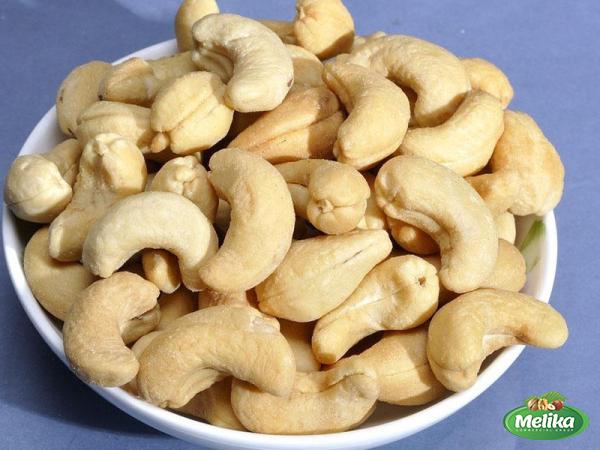The cashew apple, a fruit native to tropical regions, is often overshadowed by its more prominent sibling, the cashew nut. Despite its lesser-known status, the cashew apple boasts a plethora of intriguing qualities that make it a fascinating subject of exploration. This article aims to delve deeper into the various aspects of the cashew apple, including its origins, characteristics, uses, nutritional benefits, and economic significance. Origin and Characteristics: The cashew apple, scientifically called Anacardium occidentale, hails from northeastern Brazil and is now widely cultivated in various tropical regions globally. The fruit develops from the cashew tree, primarily known for its nut production. The cashew apple is bulbous in shape, with a size ranging from 5 to 10 cm in diameter. It typically has a vibrant yellow or red color, depending on the variety. The outer skin is waxy, offering a protective layer, while the fruit itself is juicy and pulpy. Distinctive Features: One of the most distinctive features of the cashew apple is the protruding cashew nut, which is attached to the lower end of the fruit. This unique arrangement makes the cashew apple easily recognizable. However, it’s important to note that the cashew nut is not the true nut but rather the seed of the fruit. Uses and Culinary Applications: While the cashew nut is widely valued for its myriad uses, the cashew apple often goes untapped. However, in some cultures, the fruit is cherished and utilized extensively. The cashew apple’s pleasant taste, combining elements of sweetness and tartness, makes it an excellent ingredient for various culinary preparations. It can be eaten raw, juiced, or used in making desserts, jams, jellies, chutneys, and even fermented beverages like wines and liquors. Nutritional Benefits: The cashew apple boasts a substantial nutritional profile, making it a healthy addition to one’s diet. It is particularly rich in vitamin C, antioxidants, and minerals such as iron, calcium, and potassium. Additionally, the fruit is low in fat, making it an ideal choice for those seeking a healthy snack alternative. Its high fiber content aids digestion, while antioxidants contribute to overall well-being. Medicinal Properties: Traditional medicine recognizes the cashew apple for its medicinal properties. It is believed to possess antimicrobial, anti-inflammatory, and antioxidant properties. Extracts from the cashew apple have been used to treat various conditions, including fungal infections, diarrhea, gastric ulcers, and respiratory ailments. However, further research is needed to validate these claims and study the fruit’s potential in modern medicine. Economic Significance: While the cashew apple’s popularity may vary across different regions, it holds economic significance in tropical areas where it is cultivated on a large scale.

nuts
 The fruit is both a source of income and employment for many farmers, especially in countries like Brazil, India, Nigeria, Vietnam, and the Ivory Coast. In these regions, processing units are established to extract the juice and pulp from the cashew apple, contributing to local economies. Cultivation and Harvesting: The cashew apple tree thrives in tropical climates characterized by a distinct wet and dry season. It requires well-drained soil and is relatively drought-resistant once established. The tree produces fruit within three to five years of planting, and peak production occurs between the ages of eight to twelve years. Harvesting usually takes place when the fruit is fully ripe and easily detaches from the tree, ensuring optimal flavor and quality. Challenges and Future Potential: One of the key challenges associated with the cashew apple lies in its perishable nature. The fruit has a short shelf life, requiring immediate processing or consumption. This limitation has hindered its expansive global reach. However, efforts are being made to explore various preservation techniques like dehydration and canning to extend the fruit’s shelf life and widen its distribution. Furthermore, there is vast untapped potential for utilizing the cashew apple as a source of bioactive compounds for the pharmaceutical and cosmetic industries. The extraction of bioactive compounds from the cashew apple peel and pulp could lead to the development of new products with significant commercial value. Conclusion: Despite its overshadowed presence in comparison to the cashew nut, the cashew apple emerges as a versatile tropical fruit with immense potential. Its appealing taste, nutritional benefits, and medicinal properties make it an attractive ingredient for culinary preparations and traditional medicine alike. As efforts to overcome the challenges associated with preservation and distribution continue, the cashew apple’s economic significance and global popularity are expected to rise. Exploring and harnessing the various dimensions of the cashew apple can bring benefits to both local communities and consumers worldwide. Business Headings: 1. Cashew Apple Industry Overview 2. Market Demand and Trends 3. Value-Added Products and Innovative Applications 4. Export Potential and International Market Opportunities 5. Challenges and Solutions in Cashew Apple Business 6. Profitability and Return on Investment 7. Sustainable Cashew Apple Farming Practices 8. Establishing Processing Units and Supply Chain Management 9. Government Support and Policy Initiatives 10. Collaborations and Partnerships for Market Expansion 11. Branding and Marketing Strategies 12. Future Prospects and Conclusion 1. Cashew Apple Industry Overview: The cashew apple industry has gained significant momentum in recent years, fueled by growing consumer awareness and appreciation for tropical fruits. Despite its underutilization, the unique characteristics of the cashew apple have attracted attention from food manufacturers, beverage companies, and health-conscious consumers. 2. Market Demand and Trends: The demand for cashew apple products is on the rise globally, driven by the increasing popularity of natural and organic food products. Consumers are becoming more receptive to the exotic flavors and nutritional benefits offered by the cashew apple.
The fruit is both a source of income and employment for many farmers, especially in countries like Brazil, India, Nigeria, Vietnam, and the Ivory Coast. In these regions, processing units are established to extract the juice and pulp from the cashew apple, contributing to local economies. Cultivation and Harvesting: The cashew apple tree thrives in tropical climates characterized by a distinct wet and dry season. It requires well-drained soil and is relatively drought-resistant once established. The tree produces fruit within three to five years of planting, and peak production occurs between the ages of eight to twelve years. Harvesting usually takes place when the fruit is fully ripe and easily detaches from the tree, ensuring optimal flavor and quality. Challenges and Future Potential: One of the key challenges associated with the cashew apple lies in its perishable nature. The fruit has a short shelf life, requiring immediate processing or consumption. This limitation has hindered its expansive global reach. However, efforts are being made to explore various preservation techniques like dehydration and canning to extend the fruit’s shelf life and widen its distribution. Furthermore, there is vast untapped potential for utilizing the cashew apple as a source of bioactive compounds for the pharmaceutical and cosmetic industries. The extraction of bioactive compounds from the cashew apple peel and pulp could lead to the development of new products with significant commercial value. Conclusion: Despite its overshadowed presence in comparison to the cashew nut, the cashew apple emerges as a versatile tropical fruit with immense potential. Its appealing taste, nutritional benefits, and medicinal properties make it an attractive ingredient for culinary preparations and traditional medicine alike. As efforts to overcome the challenges associated with preservation and distribution continue, the cashew apple’s economic significance and global popularity are expected to rise. Exploring and harnessing the various dimensions of the cashew apple can bring benefits to both local communities and consumers worldwide. Business Headings: 1. Cashew Apple Industry Overview 2. Market Demand and Trends 3. Value-Added Products and Innovative Applications 4. Export Potential and International Market Opportunities 5. Challenges and Solutions in Cashew Apple Business 6. Profitability and Return on Investment 7. Sustainable Cashew Apple Farming Practices 8. Establishing Processing Units and Supply Chain Management 9. Government Support and Policy Initiatives 10. Collaborations and Partnerships for Market Expansion 11. Branding and Marketing Strategies 12. Future Prospects and Conclusion 1. Cashew Apple Industry Overview: The cashew apple industry has gained significant momentum in recent years, fueled by growing consumer awareness and appreciation for tropical fruits. Despite its underutilization, the unique characteristics of the cashew apple have attracted attention from food manufacturers, beverage companies, and health-conscious consumers. 2. Market Demand and Trends: The demand for cashew apple products is on the rise globally, driven by the increasing popularity of natural and organic food products. Consumers are becoming more receptive to the exotic flavors and nutritional benefits offered by the cashew apple.
Specifications of nuts
 Additionally, the rising interest in plant-based diets and functional foods further augments the demand for cashew apple-based products. 3. Value-Added Products and Innovative Applications: The cashew apple presents an array of opportunities for value addition. With its unique flavor profile and rich nutritional content, the fruit can be incorporated into various products, such as fruit bars, juices, smoothies, dried snacks, and health supplements. Innovative applications, such as cashew apple-infused teas, skincare products, and natural food colorants, further expand the possibilities for this versatile fruit. 4. Export Potential and International Market Opportunities: While the cashew apple industry is well-established in certain tropical regions, there is immense untapped potential for international market expansion. Cashew apple products have the opportunity to appeal to consumers seeking novel and exotic flavors. Countries with a strong presence in the global cashew trade, like Vietnam and India, have already started exploring export opportunities for cashew apple-based products. 5. Challenges and Solutions in Cashew Apple Business: The cashew apple business faces several challenges, including the fruit’s short shelf life, processing constraints, lack of awareness, and limited infrastructure for transportation and storage. However, technological advancements in food preservation techniques, cold chain logistics, and packaging solutions offer solutions to extend the fruit’s shelf life and ensure product quality. 6. Profitability and Return on Investment: The cashew apple business, when managed efficiently, has the potential for profitability and a healthy return on investment. By optimizing the use of the entire cashew fruit, including the nut and apple, value can be maximized, reducing waste and increasing profit margins. Additionally, diversifying product offerings and targeting niche markets can contribute to revenue growth. 7. Sustainable Cashew Apple Farming Practices: Sustainability is becoming increasingly important in the agricultural sector. Adopting sustainable farming practices ensures the long-term viability of cashew apple production and helps maintain ecological balance. Techniques such as organic farming, water conservation, and soil management can contribute to the sustainability of cashew apple orchards. 8. Establishing Processing Units and Supply Chain Management: The establishment of processing units near cashew apple farms is crucial for efficient production and value addition. By converting the fruit into various processed forms, such as juice concentrates or dried snacks, the perishability issue is addressed, enabling wider distribution and market reach.
Additionally, the rising interest in plant-based diets and functional foods further augments the demand for cashew apple-based products. 3. Value-Added Products and Innovative Applications: The cashew apple presents an array of opportunities for value addition. With its unique flavor profile and rich nutritional content, the fruit can be incorporated into various products, such as fruit bars, juices, smoothies, dried snacks, and health supplements. Innovative applications, such as cashew apple-infused teas, skincare products, and natural food colorants, further expand the possibilities for this versatile fruit. 4. Export Potential and International Market Opportunities: While the cashew apple industry is well-established in certain tropical regions, there is immense untapped potential for international market expansion. Cashew apple products have the opportunity to appeal to consumers seeking novel and exotic flavors. Countries with a strong presence in the global cashew trade, like Vietnam and India, have already started exploring export opportunities for cashew apple-based products. 5. Challenges and Solutions in Cashew Apple Business: The cashew apple business faces several challenges, including the fruit’s short shelf life, processing constraints, lack of awareness, and limited infrastructure for transportation and storage. However, technological advancements in food preservation techniques, cold chain logistics, and packaging solutions offer solutions to extend the fruit’s shelf life and ensure product quality. 6. Profitability and Return on Investment: The cashew apple business, when managed efficiently, has the potential for profitability and a healthy return on investment. By optimizing the use of the entire cashew fruit, including the nut and apple, value can be maximized, reducing waste and increasing profit margins. Additionally, diversifying product offerings and targeting niche markets can contribute to revenue growth. 7. Sustainable Cashew Apple Farming Practices: Sustainability is becoming increasingly important in the agricultural sector. Adopting sustainable farming practices ensures the long-term viability of cashew apple production and helps maintain ecological balance. Techniques such as organic farming, water conservation, and soil management can contribute to the sustainability of cashew apple orchards. 8. Establishing Processing Units and Supply Chain Management: The establishment of processing units near cashew apple farms is crucial for efficient production and value addition. By converting the fruit into various processed forms, such as juice concentrates or dried snacks, the perishability issue is addressed, enabling wider distribution and market reach.
buy nuts
 Ensuring an effective supply chain, from the farm to the processing unit and onward to distribution channels, plays a critical role in maintaining product quality and meeting market demand. 9. Government Support and Policy Initiatives: Government support and favorable policies can significantly boost the cashew apple industry. Initiatives like financial incentives, research and development grants, infrastructure development, and training programs for farmers and entrepreneurs can facilitate the growth of the industry. Government support also plays a vital role in promoting exports by facilitating international trade agreements and quality certifications. 10. Collaborations and Partnerships for Market Expansion: Collaborations between cashew apple farmers, processors, and manufacturers can foster innovation, share resources, and create synergies to penetrate new markets and expand product offerings. Establishing partnerships with universities, research institutions, and food technology companies can drive product development, quality improvement, and market access. 11. Branding and Marketing Strategies: Effective branding and marketing strategies are essential for creating awareness and positioning cashew apple products in the market. Building a strong brand identity, highlighting the fruit’s unique attributes, and leveraging its nutritional benefits can attract health-conscious consumers. Utilizing social media platforms, food events, and collaborations with influencers can generate buzz and entice consumers to explore cashew apple products. 12. Future Prospects and Conclusion: The cashew apple industry holds immense promise for growth and development. With increasing consumer interest in sustainable and nutritionally rich foods, the fruit’s unique characteristics offer a competitive edge in the market. By addressing challenges related to processing, preservation, and distribution, along with supportive policies and collaborations, the global market potential for cashew apple and its value-added products is poised for significant expansion. In conclusion, the cashew apple, often overshadowed by the cashew nut, is a versatile tropical fruit with untapped potential. Its pleasant taste, nutritional benefits, and medicinal properties make it an attractive ingredient for culinary applications and traditional medicine. The cashew apple industry is witnessing growth, driven by increasing market demand and trends favoring natural, exotic flavors, and functional foods. By addressing challenges, adopting sustainable practices, establishing processing units, and leveraging branding and marketing strategies, the cashew apple business can thrive and contribute to the global food industry.
Ensuring an effective supply chain, from the farm to the processing unit and onward to distribution channels, plays a critical role in maintaining product quality and meeting market demand. 9. Government Support and Policy Initiatives: Government support and favorable policies can significantly boost the cashew apple industry. Initiatives like financial incentives, research and development grants, infrastructure development, and training programs for farmers and entrepreneurs can facilitate the growth of the industry. Government support also plays a vital role in promoting exports by facilitating international trade agreements and quality certifications. 10. Collaborations and Partnerships for Market Expansion: Collaborations between cashew apple farmers, processors, and manufacturers can foster innovation, share resources, and create synergies to penetrate new markets and expand product offerings. Establishing partnerships with universities, research institutions, and food technology companies can drive product development, quality improvement, and market access. 11. Branding and Marketing Strategies: Effective branding and marketing strategies are essential for creating awareness and positioning cashew apple products in the market. Building a strong brand identity, highlighting the fruit’s unique attributes, and leveraging its nutritional benefits can attract health-conscious consumers. Utilizing social media platforms, food events, and collaborations with influencers can generate buzz and entice consumers to explore cashew apple products. 12. Future Prospects and Conclusion: The cashew apple industry holds immense promise for growth and development. With increasing consumer interest in sustainable and nutritionally rich foods, the fruit’s unique characteristics offer a competitive edge in the market. By addressing challenges related to processing, preservation, and distribution, along with supportive policies and collaborations, the global market potential for cashew apple and its value-added products is poised for significant expansion. In conclusion, the cashew apple, often overshadowed by the cashew nut, is a versatile tropical fruit with untapped potential. Its pleasant taste, nutritional benefits, and medicinal properties make it an attractive ingredient for culinary applications and traditional medicine. The cashew apple industry is witnessing growth, driven by increasing market demand and trends favoring natural, exotic flavors, and functional foods. By addressing challenges, adopting sustainable practices, establishing processing units, and leveraging branding and marketing strategies, the cashew apple business can thrive and contribute to the global food industry.











Your comment submitted.